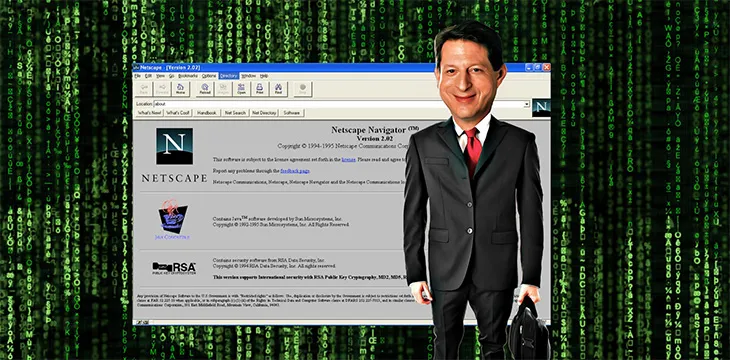|
Getting your Trinity Audio player ready...
|
A year ago, I left the world of broadcasting, where I’d been a technology and business journalist for many years. I joined CoinGeek to learn about and report on the world of Bitcoin. What I’ve seen in the past year has often reminded of previous tech revolutions and made me ponder on what’s the same and what’s different. This is just one example.

Bill Clinton’s Vice-President Al Gore (above) has been much maligned over the years for trying to take credit for inventing the Internet. OK, it was probably a mistake to have said in an interview in 2000, that as a senator he “took the initiative in creating the Internet.” But as far back as 1985 Gore had been behind a bill to fund the construction of a national network of supercomputers, with the idea of linking big libraries in the U.S. So he did have a real interest in the subject.
What Gore is more justifiably criticised for is his enthusiastic promotion of a pre-Internet technology known as the Information Superhighway – a phrase he invented. This was going to be a network that would pipe data of all kinds rapidly between places for both commercial and domestic use – taking its name from the highway system that had revolutionised road transport between US states. But as an AT&T executive admitted in 1994: “the Information Superhighway is a convenient metaphor, but it’s largely a mythical thing. In a strict sense, it doesn’t exist and will never exist.”
Has this got anything to do with Bitcoin or blockchain? Well, yes, in the sense that the hype around new technology then and now is remarkably similar. Does this list sound familiar? “Self-promoting technology “gurus”, credulous journalists, wily investment bankers, ambitious entrepreneurs, and gullible investors.” It comes from Dot.con: The Greatest Story Ever Sold, an acerbic account of the dot com bubble by Jon Cassidy, who lists them as the promoters of the Information Superhighway. But from about 1995, when it was clear that the Superhighway was leading nowhere, the same kind of characters – now seen in a much more positive light – turned their attention to promoting the Internet.
Bitcoin and blockchain technologies have not been short of hype – indeed, cryptocurrencies have been compared to tulip mania even more than dot coms were before the market crashed in 2001.
For how long should we be patient in waiting for the transformation of society by blockchain? Well, the Internet was actually around for decades before technology and economics came together to create its success. Should we be worried that for all the expensive efforts to create an ‘ecosystem’ – comparable to the huge amounts of money invested by the American entertainment networks to bring the Superhighway into people’s homes – there’s still no sign of blockchain or Bitcoin discovering the kind of ‘killer app’ that the Internet found in email – something that combines ease of use with genuine innovation to produce an entirely new product?
Personally, I believe that it’s rational to keep faith in what Bitcoin can deliver – though I accept that there are intelligent sceptics who take a different view, and not just for malicious reasons.
But it’s salutary to remember the huge amount of effort and money that Time-Warner put into its Information Superhighway project in Orlando, Florida. It was called the Full Service Network, and involved set-top boxes on TV sets through which services such as banking, food delivery and video-on-demand were available. A few thousand people made use of the system before it was closed down after about a year – at an estimated cost of $150 million. Interactive television was simply not wanted by the public.
It’s sometimes said that Bitcoin is “a solution in search of a problem”. In fact, some of the problems that Bitcoin could solve are real and quantifiable: the high cost of sending money between countries; the ability to get paid for creating content in small quantities that don’t make sense with ordinary currencies; and the creation of an online data storage system that’s independent of a rent-charging commercial organisation – to name but three.
But, as with the growth of the Internet and the non-growth of Information Superhighway, to succeed, a degree of public interest – media hype, if you prefer – needs to coincide with the easy availability of a product or service that feels like a no-brainer to new users – not just email, but later, over the years, Yahoo!, Amazon, Google, Facebook, YouTube, WhatsApp and Uber.
What will be Bitcoin’s ‘how did we manage without it?’ service? Whoever can answer that question will be onto a great thing for themselves and their business, but will also lead to success for countless other businesses that can take advantage of millions of new users entering the Bitcoin world. I personally believe it’s just a matter of time before that moment arrives. There are enough bright, creative people straining to answer the question that one day, something will come along that looks so obvious that the only mystery will be why it took so long.
Listen as CoinGeek.com’s Charles Miller picks on the minds of the crypto industry’s thought leaders, experts, and insiders. Don’t miss the weekly CoinGeek Conversations on Spotify and Apple Podcast, or check out the CoinGeek Conversations YouTube playlist today.

 07-12-2025
07-12-2025 





